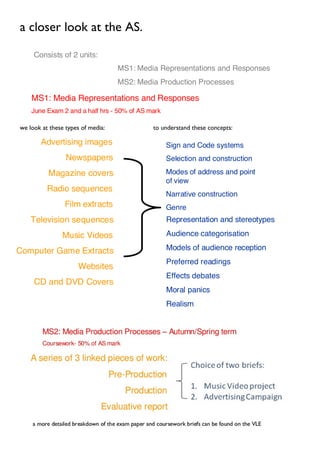This document provides an overview of the aims, objectives, expectations and assessment policies for an A-Level Media Studies course. The key points are:
- The aims of the course are to develop students' analytical skills, appreciation of different media forms, ability to form their own ideas, and confidence in presenting work.
- Students are expected to take responsibility for their own learning and work independently, as A-Levels require more effort than GCSEs.
- Assessment will include exams, coursework, class discussions and presentations to evaluate students' knowledge, skills, research abilities and practical work.
- Students are expected to spend a minimum of 3 hours per week on personal study of media topics to support their










